Jim Ed Brown and the
Browns

-
Inducted2015
-
Associated People:
- Jim Ed Brown
- Maxine Brown Russell
- Bonnie Brown Ring
Jim Ed Brown
Born April 1, 1934
Died June 11, 2015
Birthplace Sparkman, Arkansas
Bonnie Brown Ring
Born July 31, 1938
Died July 16, 2016
Birthplace Sparkman, Arkansas
Maxine Brown Russell
Born April 27, 1931
Died January 21, 2019
Birthplace Campti, Louisiana
For more than sixty years, Jim Ed Brown built a reputation as a smooth-singing, versatile performer, recording artist, and radio and TV host. The Browns—a trio he formed with his sisters Maxine and Bonnie—were perhaps the most important vocal act of the Nashville Sound era.
The Browns’ harmonies influenced the Beatles and the Osborne Brothers, and echoes of the trio’s approach can still be heard in the music of modern vocal groups such as Lady A and Little Big Town. With the Browns, as a solo artist, and as a duet singer, Jim Ed Brown recorded hits from 1954 into the early 1980s.
Formation of the Sibling Trio
Born in Sparkman, Arkansas, Jim Ed Brown grew up singing with older sister Maxine, born in Campti, Louisiana, and younger sister Bonnie, also born in Sparkman, in school and at church functions in southwestern Arkansas. In 1952, Maxine entered Jim Ed in a talent contest organized by Little Rock radio station KLRA, and although a harmonica player took first place, the station made Jim Ed a regular on Dutch O’Neal’s Barnyard Frolic, and Maxine soon joined him on the air.
By 1954, the young performers were singing on KWKH–Shreveport’s Louisiana Hayride, a virtual farm team of the Grand Ole Opry. That March, using a KWKH studio, Jim Ed and Maxine recorded their original song “Looking Back to See” for the small Fabor label. The record became a Top Ten country hit that summer, prompting the brother-sister duo to join the Ozark Jubilee on KWTO in Springfield, Missouri. Already popular on radio, the program became a regular ABC-TV feature from 1955 to 1960.
Crossover Success
After younger sister Bonnie joined the act in 1955, the Browns’ rendition of “Here Today and Gone Tomorrow” also cracked Billboard’s country Top Ten. RCA Records signed the trio in 1956, and during the period from 1956 to 1957, they scored Top Five hits with “I Take the Chance” and “I Heard the Bluebirds Sing.”
Traveling to play low-paying dates was tough, though. The Browns grew disillusioned and were planning to quit show business when their recording of “The Three Bells,” earlier a pop hit for French chanteuse Edith Piaf, topped Billboard’s country and pop charts in 1959. It even reached #10 on the R&B chart. Along with additional crossover hits “Scarlet Ribbons (for Her Hair)” and “The Old Lamplighter,” “The Three Bells” resonated with folk and pop fans, and led to network TV appearances, overseas tours, and, in 1963, Grand Ole Opry membership. During these years the Browns’ smooth sibling harmony helped country music broaden its audience by increasing its record sales and broadcasting exposure.
Songs
00:00 / 00:00
00:00 / 00:00
00:00 / 00:00
Photos
-
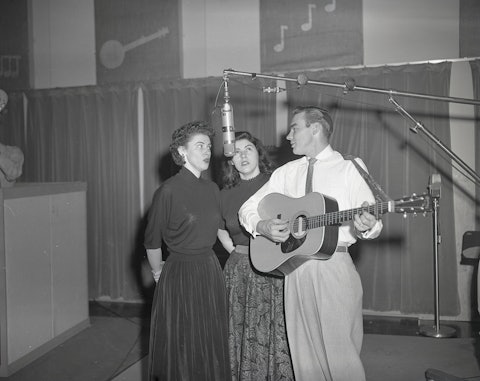
The Browns at a recording session in the TRAFCO Building Studio in Nashville, 1956. From left: Maxine Brown, Bonnie Brown, and Jim Ed Brown. Photo by Elmer Williams.
-
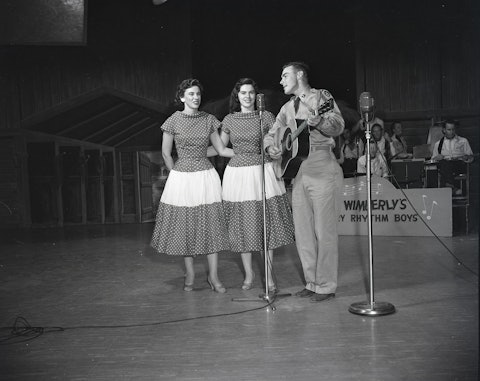
The Browns performing onstage on KWTO’s Jubilee USA in Springfield, Missouri, sometime between 1955 and 1959. From left: Maxine Brown, Bonnie Brown, and Jim Ed Brown. Photo by Elmer Williams.
-
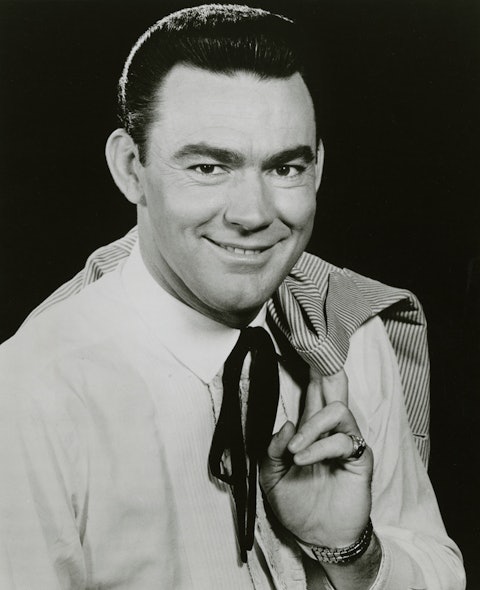
RCA Records publicity photo of Jim Ed Brown, c. 1960s.
-
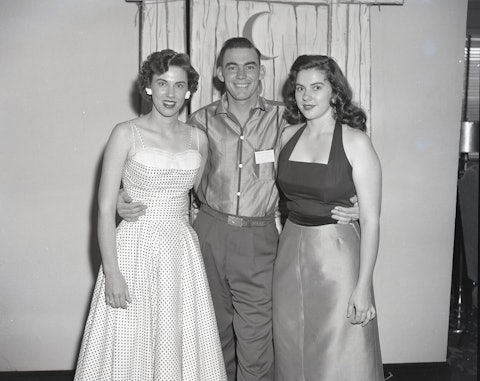
The Browns, probably at KWTO’s Jubilee USA in Springfield, Missouri, sometime between 1955 and 1959. From left: Maxine Brown, Jim Ed Brown, and Bonnie Brown. Photo by Elmer Williams.
-
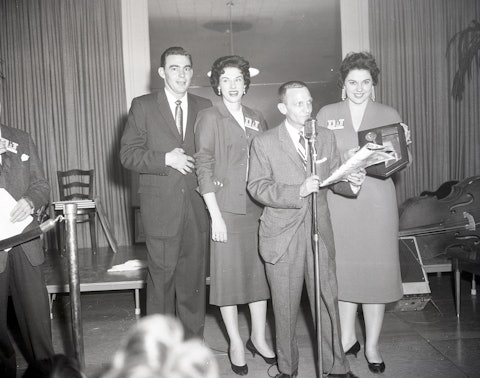
Music Reporter’s Charlie Lamb presenting a citation to the Browns during a disc jockey convention awards ceremony at a Nashville hotel, 1959. From left: Jim Ed Brown, Maxine Brown, Charlie Lamb, and Bonnie Brown. Photo by Elmer Williams.
-
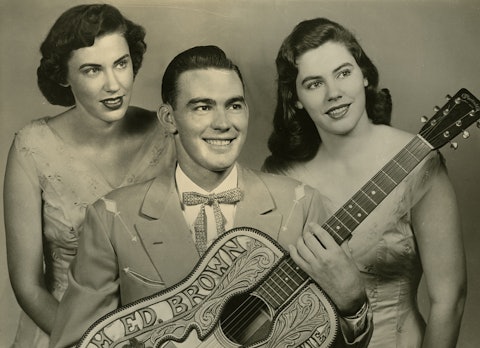
Early RCA Records publicity photo of the Browns, c. 1956. From left: Maxine Brown, Jim Ed Brown, and Bonnie Brown.
-
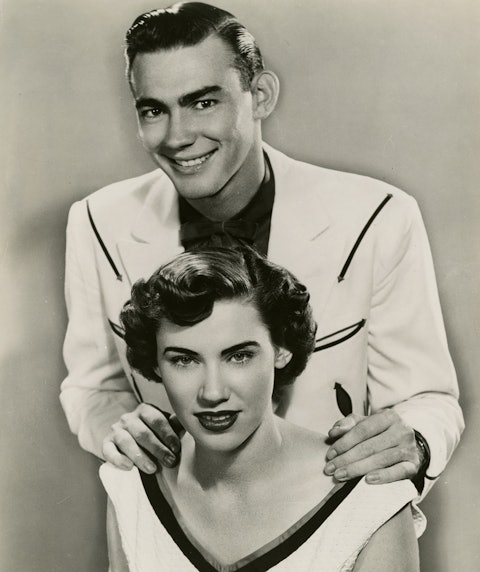
Fabor Records publicity photo of Jim Ed Brown and Maxine Brown, c. 1954.
-
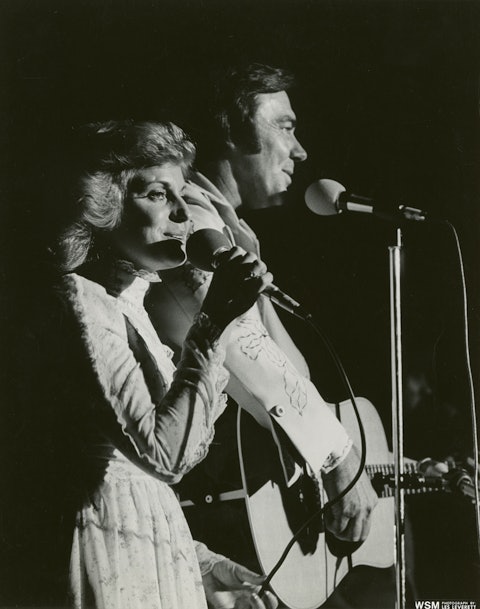
Helen Cornelius and Jim Ed Brown performing for the RCA Records Show at the sixth annual Fan Fair, 1977. Photo by Les Leverett.
-
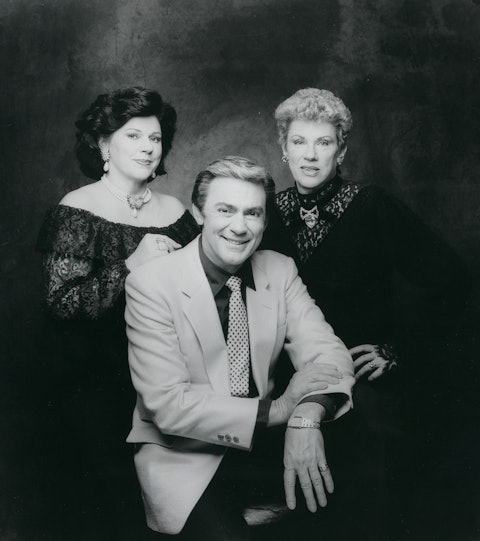
MCA Records / DOT Records publicity photo of the Browns, c. 1980s. From left: Bonnie Brown, Jim Ed Brown, and Maxine Brown.
-

Jim Ed Brown and Helen Cornelius, c. 1970s.
Jim Ed’s Solo Career
When the Browns disbanded in 1967, Maxine and Bonnie returned to Arkansas to raise their young children, while Jim Ed pursued a solo career. He had already begun placing records on the charts as a solo act for RCA in 1965 with “I Just Heard from a Memory Last Night,” and more Top Ten country hits—including his signature song, “Pop a Top” (1967), “Morning” (1970), “Southern Loving” (1973), “Sometime Sunshine” (1973), and “It’s That Time of Night” (1974)—followed.
In 1976, Brown began recording with Helen Cornelius, and a year later they were named the Country Music Association’s Vocal Duo of the Year. Their best-known hits are “I Don’t Want to Have to Marry You” (1976), “Saying Hello, Saying I Love You, Saying Goodbye” (1976), “Lying in Love with You” (1979), and “Fools” (1979).
Brown’s resonant voice and easy manner made him a natural host, not only on the Grand Ole Opry but also on other programs. He hosted six seasons of the syndicated television show Nashville on the Road between its debut in 1975 and 1981. During the 1980s, he hosted two series on the Nashville Network: the talent show You Can Be a Star and Going Our Way, the latter of which featured Brown and his wife, Becky, touring the nation.
In 2003, Brown began hosting the weekly syndicated radio program Country Music Greats Radio Show, as well as the short-form Country Music Greats Radio Minute. Both were carried by more than three hundred radio stations. The former included his own stories about life in the country music industry. Maxine Brown published an autobiography, Looking Back to See: A Country Music Memoir, in 2005.
Videos
“Scarlet Ribbons”
The Porter Wagoner Show, c. 1964
“Bottle, Bottle”
National Life Grand Ole Opry, 1967
Traveling to play low-paying dates was tough, and the Browns grew disillusioned. They were planning to quit show business when their recording of “The Three Bells” topped Billboard’s country and pop charts in 1959.
Becoming Hall of Fame Members
In 2014, Jim Ed Brown disclosed that he had been diagnosed with cancer. In January 2015, his disease evidently in remission, he returned to a warm reception on the Opry, at the Ryman Auditorium. That same month, Plowboy Records released In Style Again, Brown’s first album in thirty-five years. In March, the CMA announced that the Browns would be inducted into the Country Music Hall of Fame in the fall.
On June 3, 2015, Brown’s family revealed that his cancer had returned, and his prospects for recovery were slim. The next day, Brown’s fellow Opry star Bill Anderson, already a Country Music Hall of Fame member, joined a small group—including CMA CEO Sarah Trahern and Country Music Hall of Fame and Museum CEO Kyle Young—who visited Brown in his hospital room and presented Brown with the medallion signifying his status as Hall of Fame member. Brown died one week later.
Bonnie Brown died thirteen months after her brother. The last surviving member of the sibling trio, Maxine Brown, died in January 2019, at the age of eighty-seven.
—Chris Skinker and Stacey Wolfe
Adapted from the Country Music Hall of Fame® and Museum’s Encyclopedia of Country Music, published by Oxford University Press.



